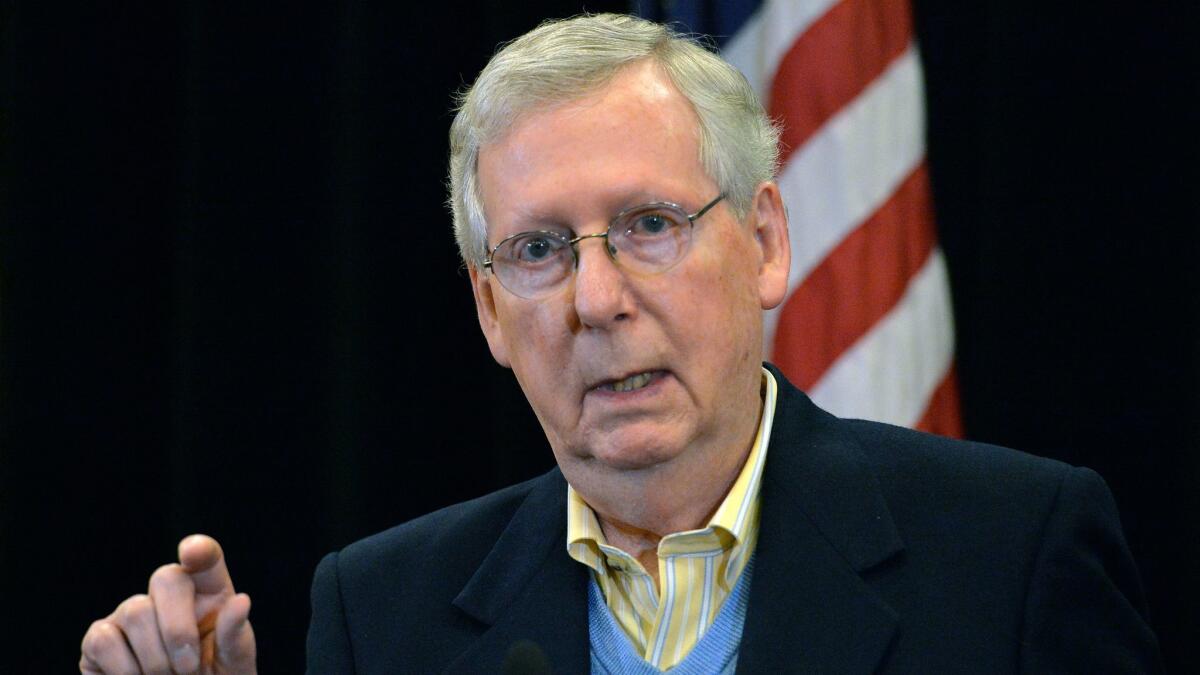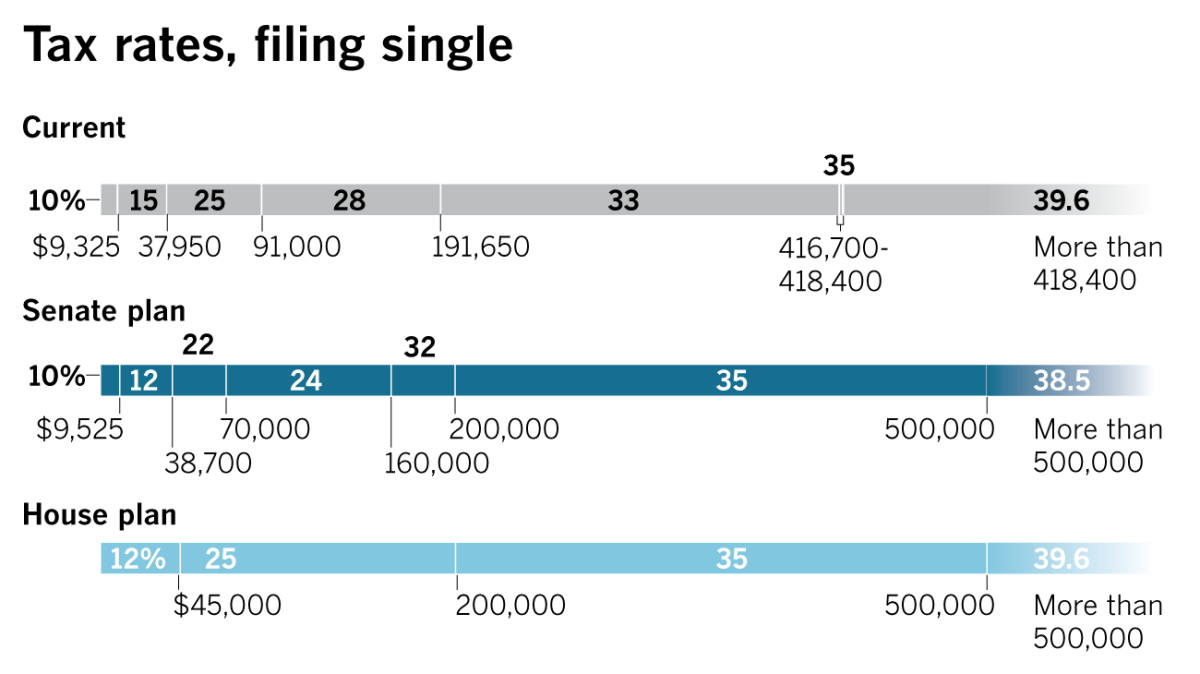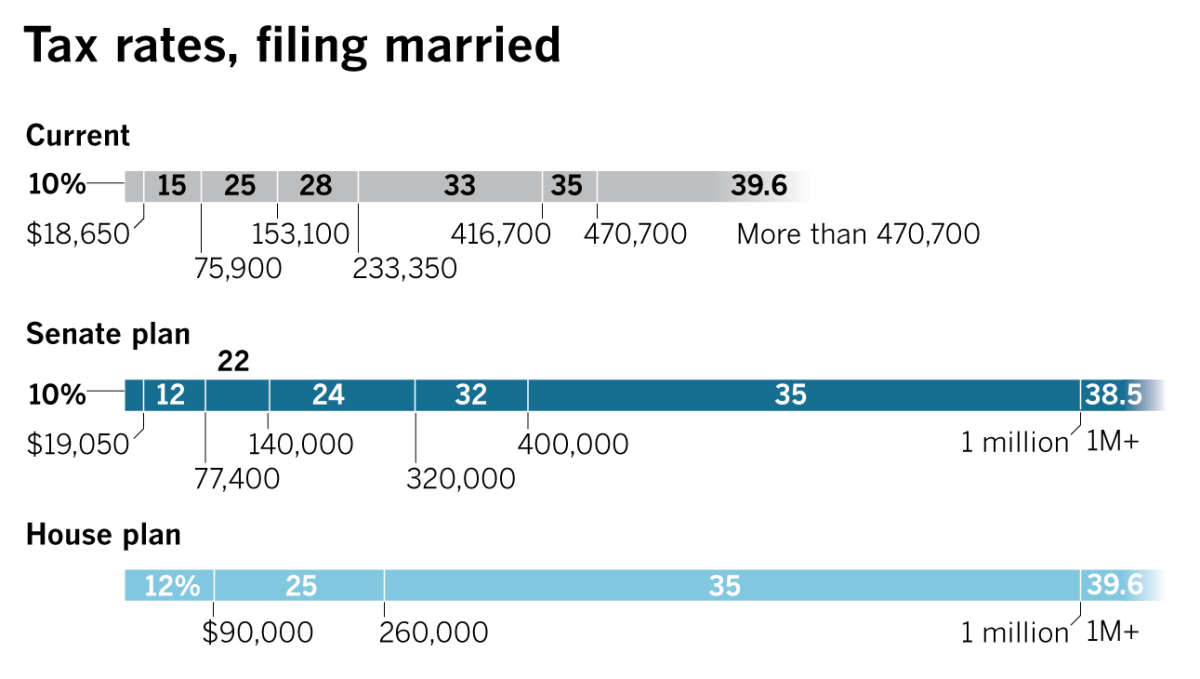Here are the biggest sticking points between the House and Senate tax bills

House and Senate Republicans are set to go to work this week to reconcile significant differences between their two tax bills.
Here are the biggest sticking points they need to resolve while making sure the legislation does not reduce revenues by more than $1.5 trillion over the next decade or, under Senate rules, add to the budget deficit after that. If it exceeds that amount, Republicans could no longer pass their tax package with a simple majority vote in the Senate.
Individual tax rates
The House bill collapses the current seven brackets into four and keeps the top tax rate of 39.6%, although it raises the income level at which that applies. The changes would take effect in 2018 and would reduce federal revenues by an estimated $1.09 trillion over the next decade, according to the congressional Joint Committee on Taxation.
The Senate bill has seven brackets, but reduces the top rate to 38.5% for income over $500,000 for single filers and $1 million for couples filing jointly. The Senate bill also reduces income levels on other brackets compared with the current levels.
To offset those costs over the next 10 years, the Senate bill calls for the changes and all its others to the individual tax code to expire after 2025. Still, the Senate bill’s individual bracket changes would reduce federal revenues by more than the House’s version — $1.17 trillion over the next decade, the Joint Committee on Taxation said.
Lawmakers will have to decide how to reconcile the two sets of brackets and whether the changes should be permanent or temporary.


Obamacare individual mandate
While the House bill makes no changes to the Affordable Care Act, the Senate bill would repeal the individual mandate that requires Americans to purchase health insurance or face a tax penalty.
The move would increase federal revenues by about $318 billion over the next decade because the government would no longer pay federal subsidies to help low- and middle-income Americans buy insurance policies, the congressional tax analysis committee said.
Repealing the individual mandate also would lead to 13 million additional uninsured Americans by 2027 and premium hikes of 10%, according to an analysis by the Congressional Budget Office.
Mortgage interest deduction
The House bill would reduce the mortgage interest deduction for future home purchases.
Homeowners would be limited to deducting interest on up to $500,000 in mortgage debt, down from the current $1 million limit. Deductions for second homes would no longer be allowed. Existing mortgages would not be affected.
The Senate bill does not change any of those provisions, which benefit states with high housing costs such as California more than elsewhere.
Estate tax
The House and Senate bills would double the exemption next year for assets subject to the estate tax, a levy of as much as 40% that hits heirs of mostly wealthy individuals.
The current exemption levels are $5.49 million for an individual and about $11 million for a couple.
Both bills also would double — to $28,000 per person and $56,000 per couple — the annual exclusion from the federal tax on gifts to children or other people.
But the House plan would repeal the estate and gift taxes entirely in 2024. That would reduce federal revenues by about $151 billion over a decade.
The Senate plan would keep the estate and gift taxes in place with the higher exemption levels. That would reduce federal revenues by $83 billion, the congressional tax analysis committee said.
Alternative minimum tax
The House bill eliminates the alternative minimum taxes for individuals and corporations. The taxes are designed to make sure people and corporations don’t avoid taxes completely.
Repealing the AMT for individuals, many of whom are very wealthy, would reduce federal revenues by about $700 billion over the next decade. Eliminating the corporate AMT would reduce federal revenues by about $40 billion over the same period, according to the Joint Committee on Taxation.
The Senate bill originally also repealed both taxes, although the individual AMT would have returned in 2026 as part of the expiration of the changes to that part of the tax code.
A last-minute need for more revenue led Senate Republicans to change the bill to keep the individual and corporate AMTs. The exemption amounts and phaseout thresholds for individuals would increase.
The Senate’s individual AMT changes would reduce federal revenues by about $636 billion over the next decade.
Corporate rate reduction timetable
The House and Senate bills permanently slash the corporate tax rate to 20% from 35%. The House cut would take effect next year, but the Senate bill delays it until 2019.
That one-year difference is significant, worth about $127 billion, according to the committee analysis.
The corporate tax reduction is the single costliest provision in both bills in terms of lost federal revenue. The House corporate tax cut reduces revenues by $1.46 trillion over the next decade. The Senate’s version reduces revenues by $1.33 trillion over the same period.
Tax rate on pass-through businesses
The House and Senate bills also reduce taxes on so-called pass-through businesses — sole proprietorships, partnerships, limited liability companies and S corporations — whose owners pay through the individual tax code.
The changes are complicated and the bills take different approaches to those taxes, which are paid by many mom-and-pop operations but also large partnerships such as law firms, hedge funds and some of President Trump’s own businesses.
The House bill would cap the top tax rate for pass-throughs at 25%, down from 39.6%.
The Senate plan would continue taxing pass-through businesses at the individual rate that would apply to the owner, with a top proposed rate of 38.5%. But the Senate bill would allow most pass-throughs to deduct about 23% of their business income from their taxes.
Twitter: @JimPuzzanghera
For the Record
2:30 p.m.: A previous version of this article stated that the Senate’s changes to the individual alternative minimum tax would reduce federal revenues by about $133 billion over the next decade. The changes would reduce revenues by about $636 billion over that period.
UPDATES:
12:10 p.m.: This article was updated with additional background about the tax bills.
This article originally was published at 11:45 a.m.
Inside the business of entertainment
The Wide Shot brings you news, analysis and insights on everything from streaming wars to production — and what it all means for the future.
You may occasionally receive promotional content from the Los Angeles Times.









